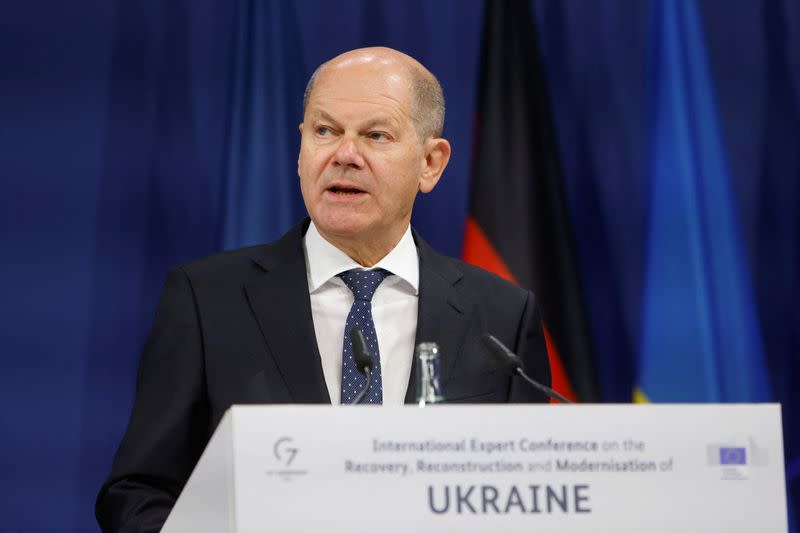Germany, Greece hopeful of an EU agreement to curb gas price spikes

By Angeliki Koutantou and Miranda Murray
ATHENS (Reuters) - German Chancellor Olaf Scholz said on Thursday he believed EU states could find a solution to contain speculative spikes in gas prices, while Greece urged EU energy ministers to reach agreement on the issue when they meet next month.
The energy crisis - aggravated by Russia slashing gas supplies to the European Union following Western sanctions over Moscow's war against Ukraine - is threatening recession in Europe as it recovers from the COVID pandemic.
European Union ministers have been struggling to agree on a way to contain natural gas prices and help their citizens cope with inflation.
"There is still more work to do for energy ministers, especially when it comes to avoiding speculative price spikes," Scholz said after meeting Greek Prime Minister Kyriakos Mitsotakis in Athens.
"We want to sink the gas prices jointly, it's our shared view that it is not something very abstract... and I believe something will be found. But that is not just done with the wave of a hand," he said.
Around 15 EU states, including Greece, want an EU-wide price cap, citing the inflationary pressure that recent gas price spikes had unleashed on their economies. Germany, Europe's biggest economy, leads a small group of states opposed to price ceilings.
Mitsotakis said that EU countries have already made progress on the issue and that it would be "a failure" if energy ministers meeting on Nov. 24 do not reach a decision on whether to ask Brussels to propose the cap.
"We don't want the issue to return to the heads of states and governments at an EU Council level. We want it to be solved at the ministers' level and it can be solved at the ministers' level," he said.
German Chancellor said that solidarity was the only way to overcome the energy crisis.
Germany is also building up its liquefied natural gas (LNG) capacities and its terminals will be able to supply European neighbours as well from 2023, he added.
Relations between Greece and Germany have improved since the Greek debt crisis that broke out in late 2009 and forced Athens to sign up to three international bailouts on tough and unpopular austerity terms, many of them suggested by Germany.
On Thursday, Scholz acknowledged Greece's economic progress.
Mitsotakis, who faces elections in 2023, said the issue of World War Two reparations - which Berlin considers settled long ago - remains open for Athens, but it will not affect the big potential the two countries have in improving business ties.
Greece emerged from its last bailout in 2018. Mitsotakis was elected a year later on pledges to boost economic recovery but the COVID-19 pandemic, the energy crisis and high inflation have slowed down his plans.
Strained relations with NATO ally Turkey have also added pressure on his conservative government.
Greece and Turkey have been at odds for decades over a range of issues including where their continental shelves start and end, over flights in the Aegean Sea, ethnically-split Cyprus and on energy exploration rights in the eastern Mediterranean.
There is no room for "other, unnecessary sources of tension" in the region, Mitsotakis said. Scholz urged Greece and Turkey to resolve their differences through dialogue, adding that good neighbourly relations "are significant not just for both countries, but for all of Europe and trans-Atlantic relations".
(Additional reporting by Renee Maltezou and George Georgiopoulos; Editing by Susan Fenton)

 Yahoo Finance
Yahoo Finance 